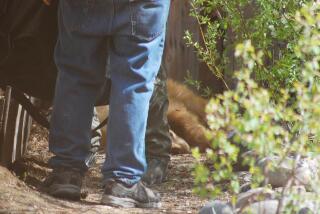Reports of Murder Scene Differ
- Share via
FRESNO — Neighbors who watched this city’s worst mass murder unfold Friday are disputing the official police account that no shots were heard as Marcus Wesson allegedly killed nine family members in a back bedroom.
Police had been on the scene for more than 30 minutes when, neighbors said, they heard the gunshots -- two or three muffled sounds that seemed to come from inside the house.
“Not long after the police came, I heard one of the ladies cry so awful, so weird, that the whole block could hear her. And then I heard a ‘boom, boom,’ ” recalled Barbara Alec, who lives next door. “The police had to hear the same sound. Then I heard the lady or another one scream ‘It wasn’t supposed to happen this way.’ ”
Alec and another neighbor said police arrived around 2:30 p.m. and talked outside to Wesson, 57, and several women who had converged on his house that afternoon, pleading to regain custody of their children.
After 30 minutes of conversation, Wesson dashed inside the house and the mothers began to scream hysterically, the neighbors said. At first, the officers followed Wesson into the tiny house as he holed up in a back bedroom, neighbors said, but then the officers retreated to the outside.
Michael Caskey, a teenager who lives across the street with his parents, said he then heard at least two gunshots as he watched from his kitchen window.
“The women were pleading with the officers to do something, and the officers” followed Wesson inside, he said. “Then the officers came back out, and I heard the gunshots. One of the women became so upset with police that she started banging on the hood of the patrol car.”
The accounts of the neighbors appear to match the official police version, except for the sound of gunfire, said Fresno Police Lt. Herman Silva. “The fact that residents are saying they heard shots fired is one of those things that raises the hair on the back of any officer’s neck. Because gunshots mean you respond rapid entry,” Silva said.
“But our officers are saying they never heard any gunshots, any yelling or anything to indicate that anyone was in danger.”
Two patrol cars initially responded to the child-custody dispute at the residence in a working class neighborhood in central Fresno. After trying to resolve the dispute between Wesson and the mothers, Silva said, officers watched Wesson head back into the house and the women outside then become hysterical. Silva said their screams and cries baffled officers because, at that point, Wesson seemed calm and reasonable to them.
Nonetheless, the officers decided to follow Wesson inside. They encountered several adults in the front room who told them that Wesson had gone into the back bedroom with a gun, Silva said.
Officers “entered the residence without consent, evacuated the adults in the front room and then went to the rear of the house,” Silva said. “They see that the bedroom door is closed. They call out to him and he doesn’t reply. They retreat to near the front door.”
As more officers responded to the scene, the SWAT team was called, Silva said. It was close to 4 p.m. when the team arrived.
“The officers yell for him to come out. They still are not hearing any noise. When the SWAT team arrives and begins to move in, Mr. Wesson suddenly appears and surrenders.”
When police entered the home they found the bodies of nine victims, including seven children, fatally shot and piled in the back bedroom. Police believe that Wesson fathered all nine victims, ages 1 to 25, and that two of the victims may also have been his grandchildren from an incestuous relationship with one of his deceased daughters
Neighbors and acquaintances say Wesson, who renovated houses and collected antiques, had relationships with at least six women who bore his children and worked as waitresses and hotel clerks to support him.
They said the women adhered to a strict lifestyle he dictated, which included home schooling, modest clothing and a rejection of America’s mainstream culture.
“They treated him like he was some supreme leader,” said Caskey, the teenage neighbor. “The women were always dressed in long skirts and high heels. They dressed that way even when they were raking leaves. He’d sit in a chair and direct them.”
More to Read
Sign up for Essential California
The most important California stories and recommendations in your inbox every morning.
You may occasionally receive promotional content from the Los Angeles Times.













